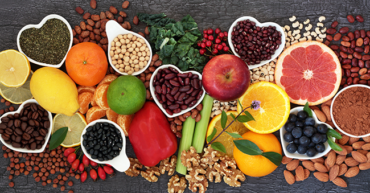July 13, 2023
The Sweet Devil

By Ram Rao, Ph.D., Principal Research Scientist for Apollo Health
Primarily known as “fruit sugar” because it occurs naturally in many fruits, fructose is a natural constituent of honey, sugar beets, sugar cane, and vegetables. Fructose is the sweetest naturally occurring sugar and is therefore added as an ingredient to packaged foods and beverages to confer a sweet taste. There are other reasons besides sweetness for fructose to be added to foods. It is highly water-soluble, blends easily in beverages, is extremely good at absorbing water, and is a powerful humectant (helps retain moisture and improves shelf life). These properties are attractive to the food industry, and hence fructose is one of the most common ingredients in foods. But is it safe to consume this sweet product?
Fructose, a monosaccharide or a “single” sugar is a naturally occurring sugar found primarily in fruits (including apples, dates, figs, pears, and prunes), vegetables (artichokes, asparagus, mushrooms, onions, beets, and red peppers), honey, and sugar cane. Sucrose, or ‘table sugar,’ is a dual sugar that breaks down to fructose and glucose. While fructose and glucose have the same chemical formula, there is a minor difference in the molecular structure which makes fructose one and a half times sweeter than glucose and other sugars. Pure fructose is commercially obtained from corn or sucrose for its usage in packaged foods, dairy, baked goods, and beverages. Unlike glucose and other sugars, fructose undergoes a somewhat different metabolism in the body. Most of the fructose we consume is metabolized directly by the liver, which converts it into energy sources for the body through a process that is not dependent on insulin. Unlike glucose, fructose does not cause a spike in insulin and blood sugar levels. Despite that, researchers and nutritionists believe that fructose possesses a devilish nature as it is a key driver of several diseases, including obesity, type-2 diabetes, heart disease, and cancer.
Fructose in the form of high fructose corn syrup (HFCS) is used to sweeten soft drinks and is found in a wide variety of processed foods, including salad dressings, ketchup, jams, jellies, baked items, ice cream, and more. The amount of fructose in HFCS added to foods ranges from 40 to 90 percent over regular corn syrup. The US Agriculture Department has calculated that the average American consumes more than 40 pounds of HFCS annually. When people eat a caloric-rich diet high in fructose, the liver gets overloaded and starts turning the fructose into fat. Excess consumption of fructose-based foods may:
● Impair the composition of blood lipids. Fructose may raise the levels of VLDL cholesterol (a bad form of cholesterol), leading to fat accumulation in organs and blood vessels that could trigger heart disease.
● Increase blood levels of uric acid, leading to gout and high blood pressure.
● Cause deposition of fat in the liver, potentially leading to non-alcoholic fatty liver disease
● Promote overeating and trigger obesity. Fructose doesn’t suppress appetite like glucose, so excess fructose consumption may cause leptin resistance and disturbed body fat regulation leading to excess weight.
Researchers have now linked fructose to a range of diseases — from diabetes to cardiovascular disease and from Alzheimer’s disease to mental diseases. Researchers identified hundreds of genes that are influenced by fructose resulting in these health issues. The genes that are altered by fructose are primarily involved in regulating cellular metabolism, cell communication, and inflammation. Among the conditions that alterations to these genes can cause are Alzheimer’s, Parkinson’s disease, depression, bipolar disorder, and other brain diseases. Fructose damages communication between brain cells and increases toxic molecules in the brain. Long-term consumption of fructose-based foods diminishes the brain’s ability to learn and remember information.
In a recent study co-authored by Dr. Dale Bredesen, researchers showed that when a solution of HFCS was substituted for the drinking water of rats, the animals had trouble figuring out a complicated maze that they seamlessly navigated before the study began. This study is the first to demonstrate that HFCS can slow the brain and compromise memory and learning. In addition to a decline in synaptic activity, the rats also developed signs of insulin resistance. The researchers suggest that since insulin can penetrate the blood-brain barrier, it may have affected neurons resulting in poor learning and memory loss. They also believe that too much fructose in the diet interferes with insulin’s ability to regulate sugar, thereby impeding the production of energy required for the normal processing of thoughts and emotions. Thus, researchers are unequivocal in their opinion that fructose consumption, even in the short term, can adversely influence brain health by promoting neuroinflammation, brain mitochondrial dysfunction, oxidative stress, and insulin resistance. So let us be wary of fructose- sweet it may be, but remember it also possesses a devilish nature.
Now what if you are craving fruit, dessert, or some sweet item? Sadly, many modern fruits are selectively bred, so they are larger and sweeter, resulting in varieties that are extremely high in fructose. We recommend organic, local, and seasonal fruits with a low glycemic index or net carbs. A small serving of fruit especially combined with nuts can be a perfect dessert. Fruits like wild berries, blueberries, strawberries, raspberries, cranberries, mulberries, pomegranates, and blackberries should be prioritized as they are rich in polyphenolic compounds that prevent cognitive decline. We also recommend eating whole fruit as opposed to fruit juice. Furthermore, you may add small amounts of approved sweeteners to some berries that are very sour and unpalatable. For more on fruits and sweeteners, see Chapters 6 and 7 in our guides available to members of our PreCODE and ReCODE programs.




